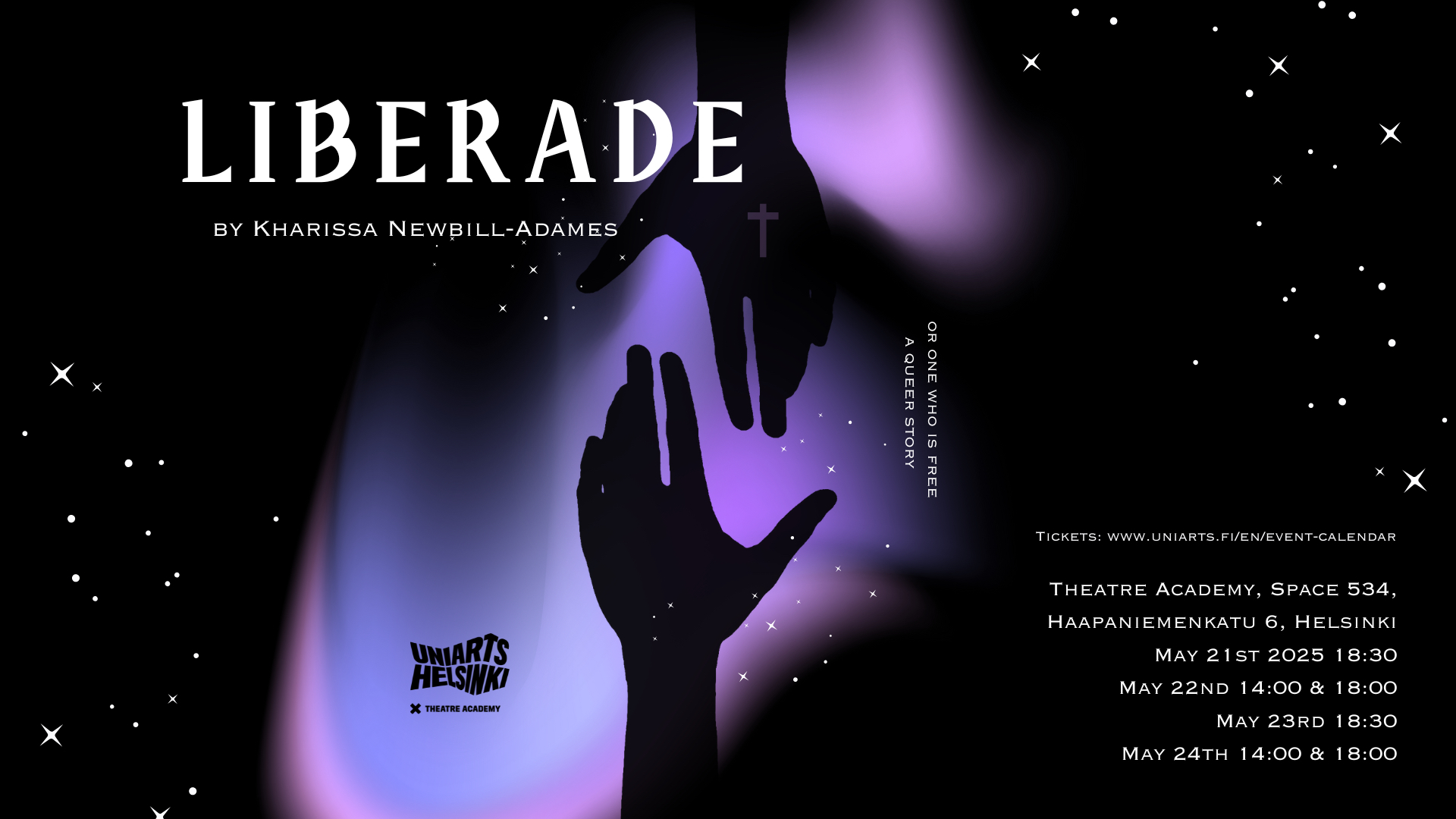Programme: Liberade

Liberade being not only the first play I’ve written but also the first production I’ve led in Finland and as a part of my MA program holds a special significance for me as I look back on the journey that’s led us here. Over the last 9 months I’ve made my foray into the field of Magical Realism theatre and questioned what it could look like for me on a stage. Naturally, my mind went to Catholicism and the mysticism that surrounds it, as it is quite magical and supernatural in its very nature. I was raised in the church, and Catholicism is as much my culture as Panama is. Even now, I hesitate to either call myself “Catholic” or to reject it entirely, falling instead onto the label of Folk Catholic to make sense of this part of my identity. The queerphobia present in the church is well known to me, and in writing this play I stumbled onto personal details that I couldn’t bring myself to leave out. Like Eme, our lead in this play, I sang in my church’s choir, and like them my mother to this day recites the gospel during mass. I too have had a panic attack in the church bathroom during a homophobic homily given by a judgmental priest. All of this has echoed waves throughout my life and affected my relationship to queerness, and in that manner has affected all queer people who’ve had the misfortune of meeting cruelty and rejection by the church that was raised them. During the process I listened to artists like Ethel Cain, Troye Sivan, Gigi Perez, Chase Petra, and Maddie Buckley who all echoed back to me the same through: that guilt and pain worms its way into every crevice of the wounds left by our upbringing, and that as good Christians we find ourselves seeking absolution and forgiveness wherever we can. For Catholics, this last urge digs even deeper, as we’re surrounded by hundreds of martyrs who’ve sacrificed themselves in the name of church and told to emulate them in our day-to-day life. Perhaps it’s this self-flagellation that makes our pain ever so sweet; And perhaps it’s this that makes us so reluctant to separate ourselves from the church in the way other Christian denominations are capable of. Either way, I hope that through Emma’s story I’m able to vocalize this wound and allow others to bear witness to what I and many before me and after will experience. Liberade: from the Spanish word librar which means to free; therefore, liberade or liberada or liberado then becomes they or she or he who is free. May we all find freedom within the honoring of ourselves, through the authenticity that comes with living and not self-effacing ourselves to Gods or Institutions.
St. Liberada’s story:
The virgin martyr, Santa Librada, was never officially canonized by the Catholic Church and was instead revered as a folk saint in Europe and the Americas. She is often associated with St. Wilgefortis, and their legends have become conflated. In some accounts, Librada was the daughter of the pagan Portuguese king Caltheo and his wife Calisa. Caltheo sought to marry his daughter off to a Sicilian king, but Librada, wishing to remain a virgin, converted to Christianity and prayed to God for a disfigurement that would prevent the marriage. God granted Librada’s wish, and she miraculously grew a beard. After her suitor rejected her, Librada’s father, enraged, had her tortured and crucified.
She is the patron saint of women seeking freedom from abusive men.
Looking at her story through a queer lens, contemporary viewers may adopt the icon as a symbol of gender fluidity: while Liberada’s identity is not that of a trans or queer person, she subverts gendered societal expectations. Her legend disrupts ideas of binary gender. Many queer Catholics pray to St. Librada for her protection.
Working group
- Directing, Video Editing, Projection Mapping, Costume & Makeup Design: Kharissa Newbill-Adames (Degree Programme in Directing, master’s studies)
- Dramaturge: Minne Mäki (Degree Programme in Dramaturgy, master´s studies)
- Performers: Aliisa Alho (guest), Veera Lapinkoski (guest) and Malin Saine (Degree Programme in Acting in Swedish)
- Voice Actors: Siim Maaten (Degree Programme in Directing, master’s studies), and Walter Öhman (Degree Programme in Acting in Swedish)
- Scenography: Virva Myllyaho (Degree Programme in Scenography)
- Lighting Design: Pinja Juhola (Degree Programme in Lighting Design)
- Sound Design: Johanna Porola (Degree Programme in Lighting Design)
- Video Design & Cinematographer: Katariina Suvi (Degree Programme in CDPR)
- Poster: Kharissa Newbill-Adames
- Photography: Pinja Juhola
Supervising teachers
- Tuomas Fränti (Sound design)
- Sirpa Riuttala (Directing)
Supporting Services for artistic activities at TeaK
- Stage department: Selmeri Saukkonen
- Props department: Joze Peura
- Costume department: Kati Autere
- Lighting: Hanna Käyhkö
- Sound: Heikki Laakso
- AV: Jyrki Oksaharju
- Programme: Jaana Forsström
- Production coordinator: Rosa Sedita
- Producer: Venla Heikkilä and Maria Kaihovirta
Thank you
To the TeaK production team (and especially Venla Heikkilä who’s been with us from the beginning and Maria Kaihorvita who graciously took the mantle for this last month) for their enthusiastic assistance in bringing this production to life.
Performance schedule
- Wed 21.5.2025 at 18:30
- Thu 22.5.2025 at 14:00 & 18:00
- Fri 23.5.2025 at 18:30
- Sat 24.5.2025 at 14:00 & 18:00
Performance venue
Theatre Academy, Black box 534, Haapaniemenkatu 6
Estimated duration
About 45 mins
Content notices
- Performance language is in English.
- Half of the audience seats (10) are pillows on the floor and and half of them (10) are chairs.
- The play deals with the subjects of religious trauma, homophobia, queerphobia, transphobia, PTSD and death.